History in the Making
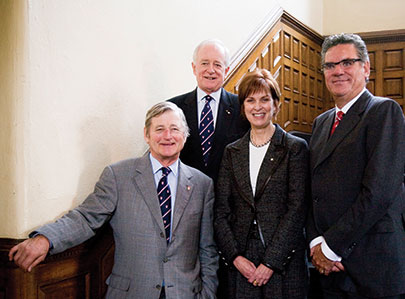
Munroe-Blum surrounded by Campaign McGill's co-chairs (left to right) Michael Meighen, Yves Fortier and Eugene McBurney
Claudio Calligaris
It was an event that will almost certainly be regarded as a milestone in McGill's long history, but when Lilia Koleva was invited to take part, she was sorely tempted to say no.
The shy second-year architecture student can think of a long list of things she'd rather do than climb up on a stage and speak into a microphone in front of dozens of strangers, with TV cameras zeroing in on her. "Every time I talk in front of a lot of people, I get nervous, especially since English isn't my first language," she explains.
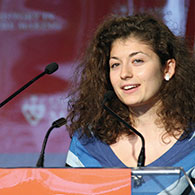
Architecture student Lilia Koleva
Owen Egan
When she was approached to participate in the press conference on October 18 that officially launched Campaign McGill: History in the Making, the University's new $750-million fundraising campaign, Koleva had a perfect way out — she had a class assignment due that same morning.
The thing is, Koleva understood why Campaign McGill was important.
Three quarters of a billion dollars is a staggering sum. It represents the largest initial goal that any university fundraising campaign has ever attempted in Canada. The University has already raised $325-million for Campaign McGill in the past three years, during the campaign's so-called silent phase — what Chancellor Richard Pound, BCom'62, BCL'67, described as "the worst-kept secret in Montreal."
A large chunk of the money raised by Campaign McGill — $75-million — will be used to fund new scholarships and bursaries for undergraduate students. Lilia Koleva knows firsthand the impact that a scholarship can have on somebody's life.
The Bulgarian native first discovered McGill a few years ago, while visiting friends in Montreal. Touring campus, she was struck by how enthusiastic the students she encountered were about their university. "They were talking about McGill with passion. That really stayed with me. Back home, universities are just places you go to study. There is little interaction between students, or between students and their professors."
The more she found out about McGill and its School of Architecture, the more she wanted to come here. But it didn't look promising.
"In Bulgaria, the economic situation isn't so good," Koleva says. "If I didn't get a scholarship, I wouldn't have been able to come to McGill."
Now the proud recipient of a McGill Faculty Scholarship, Koleva is grateful for the opportunity to be here. She enjoys the close-knit camaraderie of the students and professors in architecture — it's the sort of place where a senior professor like former director David Covo periodically roams the hallways, distributing treats.
She keeps in touch with old friends in Europe, some of whom have pursued architectural studies there. "They only get to see their professors at the front of a classroom filled with 500 students. They don't get to bounce ideas back and forth with them the way we do here."
So Koleva, a little blurry-eyed from a sleepless night — "I finished writing my paper at about six in the morning, my class was at eight and the press conference started at 10" — mustered up her courage and took to the stage.
"I understand that [potential donors] want to see the students who benefit from their gifts," Koleva says. "Otherwise, we're just numbers."
A helping hand
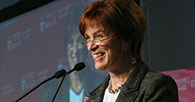
Principal Heather Munroe-Blum announces the formal launch of Campaign McGill
Owen Egan
In Michael Meighen's view, one of the reasons why Campaign McGill matters is because he knows that students aren't numbers. His perspective probably owes something to the fact that his own two sons currently attend McGill.
Meighen, BA'60, was at the campaign press conference too. One of Campaign McGill's three co-chairs, he helped make it a memorable day.
Principal Heather Munroe-Blum announced a $5-million gift from Meighen and his wife, Kelly. The Kelly and Michael Meighen Endowment for Student Advising and Support will be used to make academic advising at McGill more readily available to students and to support initiatives aimed at making the jump to university life a little less intimidating for new students.
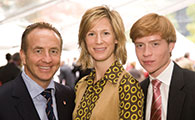
Campaign McGill international advisor John McCall MacBain with his wife Marcy and son Charles
Claudio Calligaris
One of the first programs that will likely benefit from the Meighens' generosity is Freshmen Interest Groups (FIGs). A non-credit program that was initially offered to new students in the Faculty of Science, or in the joint arts and science bachelor's program, FIGs gives frosh in their first semesters regular access to both a professor and an upper-year student in a small class setting. The discussions tend to be informal and they focus on the sorts of things that new students want to know – how they can best prepare themselves for entry into professional schools, for instance, and what the job prospects are for people in their discipline.
"When you have people coming here from other parts of the province, other parts of the country and other parts of the world, some of them as young as 17 or 18, I think it makes sense to do what you can to give them a helping hand when they find themselves in a strange environment," says Meighen, who also serves on the University's board of governors. "It makes sense to help them be in a position where they can take advantage of the academic opportunities that are available here."
Meighen applauds Munroe-Blum for making the quality of the student experience at McGill one of the central priorities of her administration, through the work of the Principal's Task Force on Student Life and Learning, for example. He thinks McGill's twin ambitions, to be both student-centred and research-intensive, mark it as a unique institution.
"McGill is trying to create an environment that offers all the advantages you would find in both a large university and a small university."
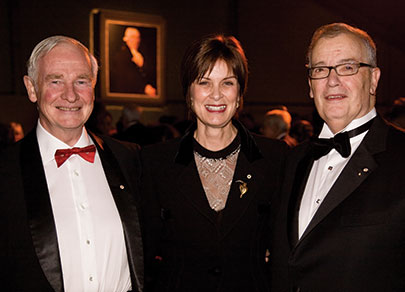
Principal Munroe-Blum is flanked by former McGill principals David Johnston (left) and Bernard Shapiro at a Campaign McGill kick-off event
Claudio Calligaris
No barriers to talent
One thing that Munroe-Blum is determined to accomplish, in large part through the money that Campaign McGill will raise, is to make sure that issues related to funding never prevent talented students from choosing McGill.
"If a student is gifted enough to succeed in this environment, I don't want money to ever be the reason why they don't come here," declares Munroe-Blum.
For Yves Fortier, BCL'58, LLD'05, another of Campaign McGill's co-chairs, that commitment from the principal played a huge role in convincing him to become involved.
"Making McGill more accessible to students who might not be able to afford the price of admission is a noble goal. That is extremely laudable."
A senior partner and chairman with the Montreal law firm Ogilvy Renault, Fortier served as Canada's ambassador and permanent representative to the United Nations between 1988 and 1992, and as president of the UN Security Council in 1989. One of the world's most respected international arbitrators — The American Lawyer/Focus Europe named him the world's top arbitrator in 2005 — Fortier finds that McGill is well known wherever he goes.
"In my work, I travel the world. I've never encountered anyone in Asia, Europe or America who was not familiar with McGill. For many of the people I deal with, McGill represents Montreal to them."
Going global
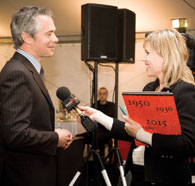
Hydro-Quebec president Thierry Vandal being interviewed by a TV reporter after announcing the utility's $10-million donation to McGill University
Claudio Calligaris
Fortier's worldwide connections are certain to come in handy. Campaign McGill will be the most internationally ambitious fundraising campaign ever attempted by a Canadian university. "McGill is the only university in the country that could have this kind of campaign," says Marc Weinstein, BA'85, BCL'91, LLB'91, McGill's assistant vice-principal (development, alumni and university relations) and the director of university campaigns.
At a presentation to McGill managers in October, Weinstein detailed how the campaign will evolve over the next year. Next spring, Campaign McGill will be officially launched in major Canadian centres — Toronto, Calgary and Vancouver. Then, launches will take place in major U.S. cities, including New York, Boston, Los Angeles and San Francisco. In December, the campaign will launch in Asia. Next will be Europe.
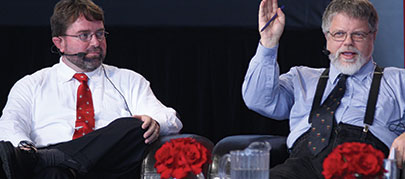
McGill School of Environment director Nigel Roulet and plant science professor Don Smith participated in the Healing Our World Symposium, in which some of the University's top professors addressed some of the planet's most vexing problems
Owen Egan
"When you look at the University of Toronto, for instance, about 85 per cent of its students come from the greater Toronto area," notes Munroe-Blum. "Twenty-five per cent of our students come to McGill from the rest of Canada and close to 20 per cent come here from other countries. There is no other university in Canada that has the same kind of international reach."
Eugene McBurney, LLB'77, Campaign McGill's third co-chair, readily agrees. The chairman of the Toronto-based GMP Securities L.P., a leader in global mining finance, McBurney says, "McGill is one of the few true meeting grounds in this country for talented young adults representing every background to come together."
Lending McGill a hand will be John McCall MacBain, BA'80, who will serve as Campaign McGill's senior advisor for international gifts.
The Geneva-based McCall MacBain's Rolodex boasts contacts from around the globe. He is the founder of Trader Classified Media, which became the world's leading company in the local classified sector, with 350 titles and 50 Internet sites in 23 countries. A former Students' Society president and, like Yves Fortier, a McGill Rhodes Scholar, McCall MacBain and his wife Marcy recently created the McCall MacBain Foundation, which funds health and education projects in sub-Saharan Africa, climate change initiatives and post-secondary education.
"I think Montrealers don't always realize what a jewel they have sitting in the middle of their home town," says McCall MacBain. "They don't always realize just how incredibly well regarded McGill is from far away. It really is seen as Canada's national university."
The McCall MacBains also made quite a splash at the press conference that launched the campaign with a $5-million gift of their own. The money will be used to create graduate fellowships in the Faculty of Arts.
Supporting graduate studies
The campaign's focus on supporting graduate students captured his attention. Campaign McGill hopes to raise $115-million for graduate fellowships. Noting that the University already has the highest proportion of graduate students in Canada, McCall MacBain says, "McGill wants to operate at the same level as the best research universities in the world and it wants to attract the best graduate students in the world."
"Graduate students are at the heart of university research and teaching, and have contributed to the teams that have made many of the most important discoveries of our time," noted Munroe-Blum at the campaign launch. "Great faculty members choose universities with great graduate students, and vice versa."
While McGill has no shortage of accomplished professors to offer as graduate advisors, the University does fall short in another important area. "In some cases, talented graduate students we've offered admission to receive fellowships from other institutions that are up to $10,000 higher than what we can afford to offer," says Munroe-Blum. In this arena, McGill finds it often just can't compete with many of the other top research universities in the country.
"This is an area where we simply have to improve," the principal insists.
After the press conference on October 18, later in the afternoon, the McGill community was invited to a pair of community barbecues — one downtown, the other at Macdonald Campus — to mark the launch of the campaign. Almost 1,500 students, staff and faculty took part, but not everyone was in a celebratory mood. Members of the student group, the Grassroots Association for Student Power, were close by, handing out flyers to passersby. GRASPé members believe that, in inviting corporate donations, McGill will also allow the corporate sector to have some say in how the University is run.
"I've heard that concern, but the evidence just isn't there to support it," says Munroe-Blum. "We have policies and practices in place to guard against that sort of thing and they work. A gift is a gift, and that means it is no strings attached. You get a tax receipt. You have the right to know that we're spending the money responsibly. But you get no access to intellectual property. You receive no authority over academic decision-making."
In any case, the corporate sector isn't expected to play a leading role during the campaign. "Roughly 10 per cent of the donations we expect to receive will come from corporations," points out Weinstein. The vast majority of gifts directed to McGill will come from individuals, families or charitable foundations.
Getting our priorities straight
Planning the campaign's fundraising goals began, in some sense, back in 2003, when Provost Tony Masi asked his deans to take careful stock of their respective faculties and to identify their priorities for the future.
"At McGill, we've tended to do our planning on a year-by-year basis and we wanted to start being much more strategic about it," explains Masi. "We wanted to think carefully about where our academic strengths were and where we thought we could become stronger in the future." Masi believed it was vital for the University to focus its resources on the areas where McGill and its researchers were clearly positioned to be world players. "Nobody can be great at everything," he says.
"We knew we were going into a campaign, so this was also an opportunity to examine our academic priorities and think about the ones that might resonate with the philanthropic community."
What came out of that process was the White Paper: Strengths and Aspirations, and one of its defining elements was a call for more interdisciplinary partnerships among McGill researchers.
"Strong alliances were already being forged here," says Masi. The Centre for Language, Mind and Brain, for instance, involves professors from the Faculties of Arts, Education, Medicine and Science, while the Centre for Interdisciplinary Research in Music Media and Technology involves music experts, psychologists, neuroscientists and computer engineers.
"The kinds of questions that are being addressed right now by researchers are bigger, more complex questions than we've ever asked before," explains Masi. "We need to bring together people who have different talents and different types of expertise to try to answer them."
McGill's professors are already busy tackling these questions, says Masi. While many of McGill's past pioneers — celebrated names like Osler, Rutherford and Penfield — continue to be honoured for their achievements, Masi isn't so sure that McGill's current corps of researchers receive their fair share of acclaim. "McGill continues to be an innovative university. We don't get enough credit for that."
World-class talents
Psychology professor Jeffrey Mogil's research on how men and women don't experience pain or respond to pain medications in quite the same way, could conceivably pave the way for a new generation of gender-specific pain treatments. Medical scientists Moshe Szyf and Michael Meaney are widely acknowledged as being at the forefront of epigenetics, a radical rethink of the interplay between nurture and nature, positing that environmental factors can fundamentally alter the nature of our genes.
In the past year alone, McGill scientists have uncovered the genetic underpinnings related to several major diseases, including breast cancer, type-2 diabetes and spina bifida. Grace Egeland, director of the Centre for Indigenous Peoples' Nutrition and Environment, recently traveled aboard an Arctic icebreaker to head up the largest Inuit health survey ever conducted in Canada.
"We really are trying to maintain a culture of excellence here," says Masi, and Campaign McGill will play a critical role in safeguarding that tradition. The campaign hopes to raise $248-million for endowed chairs and professorships, so that McGill can continue to attract top talents to its professoriate.
A few weeks after the campaign's official launch, McGill received heartening news. Not only did Maclean's name McGill as the top medical-doctoral university in the country for the third year running, but the Times Higher-QS World University Rankings, published in Britain's widely respected Times Higher Education Supplement, listed McGill as one of the top 12 universities in the world.
That kind of success, however, can be a double-edged sword.
So what's the problem
"There are occasions where I'll be talking to government officials and I'll point to the accomplishments of our students. I'll talk about the extraordinary achievements of our professors. And then I'll remind them of how the institutions we compete with, the best universities in the world, have access to much better funding than we do," says Munroe-Blum.
For instance, the University of Michigan, which is ranked as the 38th best university in the world by the Times Higher-QS, has over $135,000 in total funding per full-time student. The University of Wisconsin-Madison, rated 55th, has over $54,000 per full-time student. McGill has about $28,000 per full-time student.
"The reaction I get sometimes is 'If McGill is performing so well, what's the problem?'" As far as Munroe-Blum is concerned, that's the wrong question to ask.
"Imagine how much more we could accomplish if we had the funding to match our ambitions."
"If we don't have access to substantial private support, we simply won't be able to keep [performing at this level]," adds Meighen. "If we do get that support, then I really do think that the sky is the limit."
The press conference that announced the official launch of Campaign McGill took place on the downtown campus, very close to the spot where James McGill lived two centuries ago. Paying tribute to McGill's founder at the launch, Munroe-Blum pointed out how his goal of creating a top-notch university in the heart of Montreal must have seemed iffy at best.
"He made this bequest when his community, Montreal, was a small town at the edge of an undeveloped continent. He cast the product of his lifetime of hard work on the side of free inquiry, on the side of education independent of religious influence, at a time when there was no evidence that a piece of land, on the side of a wintry mountain, on a remote island, on a remote continent, could ever become a great university."
It did.
Somehow, the prospect of raising $750-million to firmly establish McGill as one of the world's leading universities for decades to come doesn't seem anywhere near as improbable.
For more information on Campaign McGill, please visit www.mcgill.ca/campaign.
Search
Search (skip):
A WORLD IN THE MAKING:
A comprehensive strategic evaluation of McGill's strengths has targeted five broad areas where McGill is poised to have the most impact. These are the areas that Campaign McGill will be focused on.
WELLNESS IN THE MAKING:
Advancing health by addressing such challenges as the need for a more detailed understanding of the biological basis of disease and by devising improved techniques for training health care professionals in overburdened systems
PROSPERITY IN THE MAKING:
Building the foundations of innovation by understanding how a new age of interconnectedness is transforming our world
BREAKTHROUGHS IN THE MAKING:
Creating the next generation of science and technology, as advances in bioengineering, nanoscience and computer science herald changes comparable to the agricultural and industrial revolutions
SUSTAINABILITY IN THE MAKING:
Protecting the environment for countries struggling to upgrade their economic prospects and for those striving to secure their quality of life
COMMUNITY IN THE MAKING:
Strengthening culture and civil society by deepening our knowledge of cultural histories, languages and beliefs and by using an interdisciplinary approach to better understand the major social issues of our times
AN ENERGY BOOST
One of the province's most celebrated institutions, Hydro-Québec, helped make certain that Campaign McGill was officially launched with a bang. The world's largest producer of hydroelectric power, Hydro-Québec announced a donation of $10-million to the University.
More than half the total amount of the gift, $5.5-million, will go to the establishment of research chairs in environmental and energy research in the Faculties of Science and Engineering, and $1-million will go towards funding research in nanotechnology and environmental law. The balance will support undergraduate and graduate scholarships in law, science and engineering.
The new research chairs will examine such topics as measuring and forecasting precipitation in the short term, integrating wind energy and hydroelectricity in the transmission grid, and renewable energies and decentralized production.
"This is wonderful news, for Quebec, for Quebec students, and for McGill's ability to be a leader in building a better environmental future for all of humanity," said Principal Heather Munroe-Blum. "The availability of environmentally sound energy sources is critical to Quebec's economic development and to the global fight against climate change."


